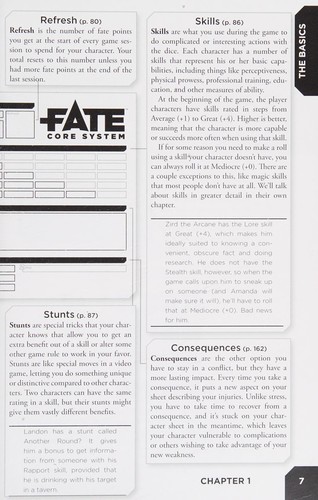dozens reviewed Fate: core system by Leonard Balsera
Review of 'Fate' on 'Goodreads'
4 stars
Who recommended it to me ##
Tomasino passively recommended it to me with their glowing goodreads review. I'm usually into the same sort of thing that they are, so I decided to give it a look-see.
## Who I'd recommend it to ##
D&D fans who want to try more story telling and fewer class restrictions.
## Summary ##
Fate is a system for collaborative story telling with a central, unifying mechanic (aspects).
This is in contrast to D&D (the only other ttrpg I've seriously played) in at least two ways:
1. Collaborative character creation and campaign creation
Although the "adversarial DM" cliche exists for a reason, the best D&D games are also collaborative to some extent or another. But not to the extent recommended by this system.
2. Characters without classes
Fate's character creation process was a revelation.
Fate is a story telling system with a unifying "aspects" mechanic. …
Tomasino passively recommended it to me with their glowing goodreads review. I'm usually into the same sort of thing that they are, so I decided to give it a look-see.
## Who I'd recommend it to ##
D&D fans who want to try more story telling and fewer class restrictions.
## Summary ##
Fate is a system for collaborative story telling with a central, unifying mechanic (aspects).
This is in contrast to D&D (the only other ttrpg I've seriously played) in at least two ways:
1. Collaborative character creation and campaign creation
Although the "adversarial DM" cliche exists for a reason, the best D&D games are also collaborative to some extent or another. But not to the extent recommended by this system.
2. Characters without classes
Fate's character creation process was a revelation.
Fate is a story telling system with a unifying "aspects" mechanic. And D&D, in contrast, is a class system with a crunchy rule set.
In D&D, roleplayers and powergamers alike, though motivated differently, often arrive at this place where they're trying to manipulate and coerce some kind of combination of classes into a satisfying character. Either way, you're working with or against the class system.
In Fate, the roleplayer would just specify the precise aspects they want, and then start to enjoy their custom "class." The powergamer meanwhile, would either stop worrying and learn to love the storytelling, or leave for another, crunchier system.
## What I liked ##
Aspects are such a great mechanic. It's very similar to Risus' mechanic of "cliches." So much so that I had to look up and see who was published first. (Risus, by a decade!)
Also, as far as rulebooks go, this one was extremely well written! Lots of inline references, lots of examples. Call outs for "veterans" of older systems. No contradictions that I could discern. Basically the opposite of a Shadowrun rulebook.

